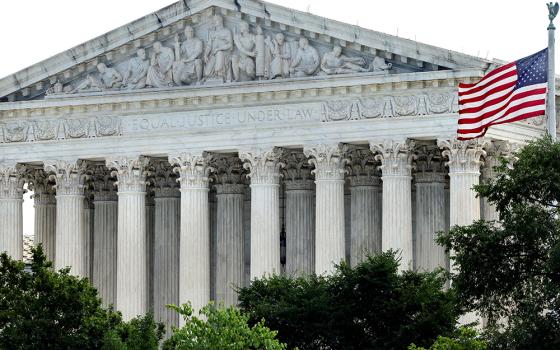CHARLOTTE, N.C. -- Belmont Abbey College is suing the federal government over a new regulation that requires employer health insurance plans to provide free coverage of contraceptives and sterilization, even if it may be contrary to their religious beliefs.
The civil lawsuit was filed Nov. 10 in U.S. District Court in Washington by the Becket Fund for Religious Liberty, a Washington-based nonprofit, public-interest law firm that is representing the Catholic liberal arts college in Belmont.
In its lawsuit, Belmont Abbey College argues that the contraception regulation forces it to violate its religious beliefs or pay a severe fine.
Named in the suit are the federal departments of Health and Human Services, Labor and Treasury and their respective heads: Secretaries Kathleen Sebelius, Hilda Solis and Timothy Geithner.
"A monk at Belmont Abbey may preach on Sunday that pre-marital sex, contraception and abortions are immoral, but on Monday, the government would force the same monk to pay for students to receive the very drugs and procedures he denounces," said Hannah Smith, senior legal counsel at the Becket Fund, in a statement issued Nov. 10.
The new contraception mandate is part of implementing the Patient Protection and Affordable Care Act of 2010, which sets up new preventative health care coverage specifically for women at no cost. That coverage includes services such as mammograms, prenatal care and cervical cancer screenings. But it also mandates free contraception, sterilizations and drugs (such as ella and "Plan B") considered by the church to be abortifacients -- all of which are contrary to Catholic teaching.
The mandate is what the federal government terms an "interim final rule," which has "the full force and effect of law." A 60-day comment period followed Sebelius' Aug. 1 announcement of the mandate and proposed exemption. That period ended Sept. 30. After such a comment period, a federal agency could issue a revised final rule "or confirm the interim rule as final."
For a religious employer that does not want to offer such services, the regulation written HHS sets out a religious exemption: An exempt religious employer is one that "(1) has the inculcation of religious values as its purpose; (2) primarily employs persons who share its religious tenets; (3) primarily serves persons who share its religious tenets; and (4) is a nonprofit organization" under specific sections of the Internal Revenue Code.
Catholic leaders across the country have decried this exemption as too narrowly drawn -- particularly parts 2 and 3 -- and violates the church's religious liberty.
During a 60-day comment period that followed the regulation's announcement Aug. 1, the U.S. Conference of Catholic Bishops, and Catholic universities and schools, hospitals and charitable organizations voiced loud objections to the mandate, which is expected to go into effect in August 2012.
The church's ministries do and should go beyond serving and employing Catholics, they say.
From food pantries to adoption services, refugee resettlement and more, the Charlotte diocese does not scrutinize clients' religious tenets before they help them. The diocese also hires people of all religious faiths, and diocesan schools enroll non-Catholic students.
Belmont Abbey College has 1,700 students and more than 200 full-time employees, not all of whom are Catholic. So, unless the college restricts its enrollment and hiring to only Catholics, it would not qualify for the religious exemption to apply to the health services and health insurance it offers to those students and employees when it renews its health insurance policy in January 2013.
Abbot Placid Solari, chancellor of Belmont Abbey College, said in a written statement Nov. 11 that the college's board of trustees "voted without dissent" to sue the federal government because the contraception regulation "is in direct opposition to the public and authoritative teaching of the Catholic Church. We therefore believe this is an egregious infringement on the part of the federal government of the right of free exercise of religion guaranteed to all American citizens by the Bill of Rights."
Added the Becket Fund in its statement, "Belmont Abbey, as a small Catholic liberal arts college, teaches that contraception, sterilization and abortion are all against God's law. The government mandate forces Belmont Abbey and others to make the Hobson's choice of either violating their deeply-held religious beliefs or paying a heavy fine and terminating their health insurance plans for employees and students."
In its lawsuit, the college states: "The government's mandate unconstitutionally coerces Belmont Abbey College to violate its deeply-held religious beliefs under threat of heavy fines and penalties. The mandate also forces Belmont Abbey College to fund government-dictated speech that is directly at odds with its own speech and religious teachings.
"Having to pay a fine to the taxing authorities for the privilege of practicing one's religion or controlling one's own speech is un-American, unprecedented, and flagrantly unconstitutional."
This legal battle over health insurance coverage and religious liberty is not new to Belmont Abbey College.
The Becket Fund also represented the college in a 2009 dispute with the federal Equal Employment Opportunity Commission over whether denying to pay for birth control in its employee health plan constituted gender discrimination.
The EEOC initially ruled in March 2009 that the complaint by eight faculty members over the health insurance policy was baseless. In July 2009, the EEOC reopened the complaint, prompting college president William Thierfelder to vow he would close the college rather than be forced to offer or subsidize health services that contradict Catholic teaching. The case remains unresolved.




